


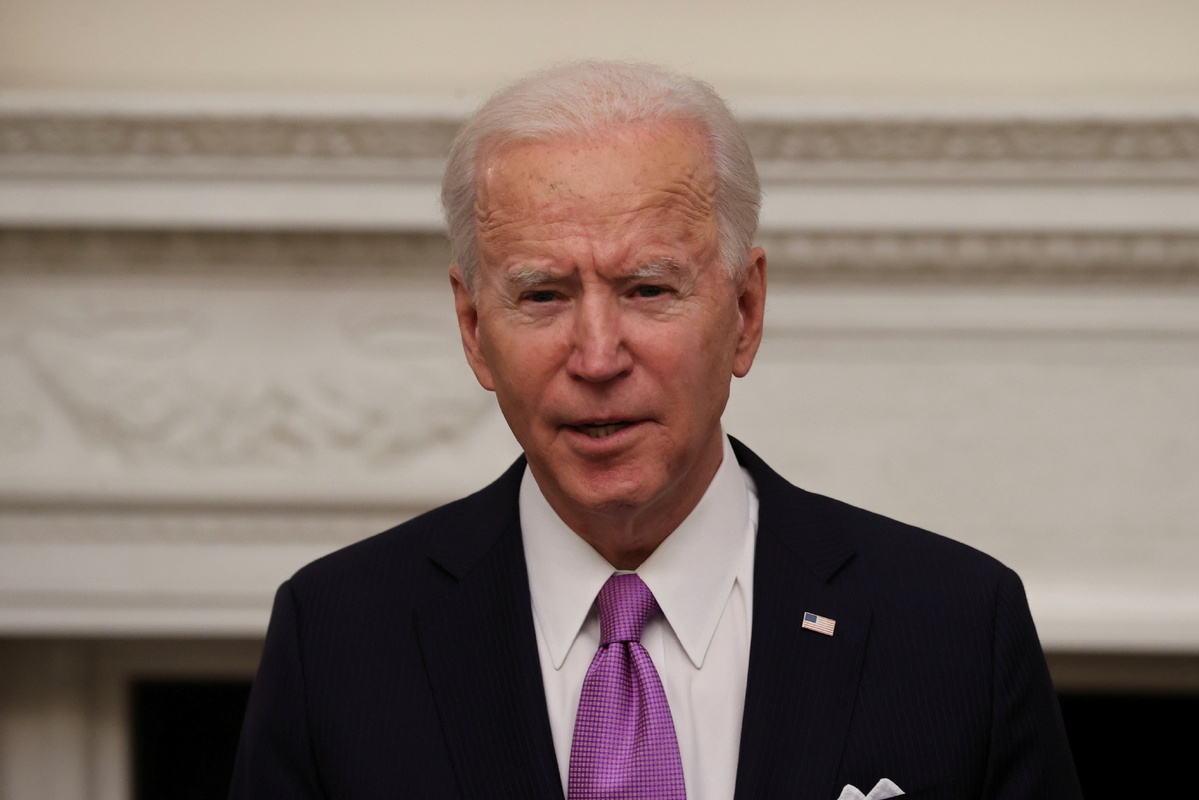
US President Joe Biden on Thursday presented his COVID-19 war plan for getting the coronavirus sweeping the country under control and saving American lives.
"History is going to measure whether we are up to the task," Biden declared in remarks to reporters in the State Dining Room of the White House.
The White House released a 200-page document that outlines the plan — "National Strategy for the Covid-19 Response and Pandemic Preparedness".
On Thursday, Biden signed 10 executive orders and presidential directives covering parts of the plan, including increasing the production and purchasing of vaccines through the Defense Production Act and mandating face masks on federal property.
Invoking the act would seek to ensure availability of glass vials, syringes gloves, N95 masks and other supplies needed for virus testing and vaccine administration.
In addition to Biden asking Americans to wear masks for 100 days, he issued a separate order to federal agencies mandating masks on federal property. The order also calls for international travelers to quarantine after arriving in the US but doesn't specify how that would be enforced.
Other orders direct the Federal Emergency Management Agency (FEMA) to reimburse states for some costs related to their COVID-19 response and to provide funds to help reopen schools.
He also is ordering FEMA to begin setting up vaccination centers at more locations, including stadiums and convention centers, and the Centers for Disease Control and Prevention (CDC) to begin a program to make vaccines available through local pharmacies starting next month.
The plan directs federal health agencies to consider raising pay for those who administer vaccines and calls for establishing a public health workforce that will help with testing and vaccinations in their communities.
Joining Biden to discuss the plan was Vice-President Kamala Harris, Dr Anthony Fauci, his chief COVID-19 medical adviser, and Jeff Zients, Biden's new White House COVID-19 response coordinator.
At one point, Biden criticized the Trump administration for not being aggressive on dealing with the pandemic, saying, "For the past year we couldn't rely on the federal government to act with the urgency and focus and coordination that we needed, and we have seen the tragic cost of that failure."
CNN reported Thursday that one Biden administration source who wasn't named claimed no plan was left for the new administration and that "we are going to have to build everything from scratch".
On Wednesday, Zients said, "What we're inheriting is so much worse than we could have imagined. The cooperation or lack of cooperation from the Trump administration has been an impediment. We don't have the visibility that we would hope to have into supply and allocations."
When a reporter asked Biden if his promise to inject 100 million vaccines in his first 100 days should be for a higher number, the president said, "When I announced, you all said it's not possible. Come on, give me a break, man.
"The brutal truth is it's going to take months before we can get the majority of Americans vaccinated," Biden said.
Fauci gave an update on the coronavirus pandemic. He said that based on recent seven-day averages, coronavirus infections may be near a plateau in the US.
"Well, obviously we're still in a very serious situation," he said. "To have over 400,000 deaths is something that is, unfortunately, historic in the very bad sense.
"However, when you look more recently on the seven-day average of cases," he added, "right now, it looks like it might actually be plateauing."
Fauci said that the new administration is also seeking and increase in production of the Moderna and Pfizer vaccines as well as the Johnson & Johnson candidate, which he said could be presented soon to US regulators for approval.
He added that if 70-80 percent of Americans are vaccinated by late September, some degree of normalcy can return to the country in the following months.
Fauci also said the coronavirus vaccine can be modified to take account of new mutations of the virus, and that while a new variant in South Africa is concerning, it doesn't appear to be in the US.
"Bottom line: We're paying very close attention to it for our alternative plans if we have to ever modify the vaccine," he said. "But right now, from the reports we have … it appears that the vaccines will still be effective against them."
Fauci said he was sometimes made uncomfortable by Trump's statements about the coronavirus because they "were not based in scientific fact".
"You didn't feel that you could actually say something and there wouldn't be repercussions about it," Fauci said, adding that working for the Biden administration "is somewhat of a liberating feeling".
He said the new administration would "be completely open and honest" in dealing with the pandemic and said everything now would be "based on science and evidence".
He also said that in the Biden administration, the rule would be "if you don't know the answer, don't guess".
"The idea that you can get up here and talk about what you know, what the evidence — what the science is, and know, 'That's it. Let the science speak,' it is somewhat of a liberating feeling," he added.
A reporter then pointed out that, while serving in the same role under Trump, Fauci "basically vanished for a few months there for a while".
"Do you feel like you're back now?" the reporter asked.
"I think so," Fauci replied with a smile.
The administration's plan is tied to a $1.9 trillion plan that Biden unveiled last week to combat the pandemic.
The plan establishes a federal COVID-19 response team to coordinate efforts across agencies and restores a White House team on global health risks that was established during the Obama administration.
It calls for regular public briefings on COVID-19 to be led by scientific experts.
Biden also will issue an order to develop a national strategy to reopen schools, hoping to meet his goal of having most K-8 schools open within his first 100 days in office.
The plan orders the Education Department and the Department of Health and Human Services to develop guidelines to help schools reopen and to share best practices from schools across the nation.
The federal government will work with schools to implement screening programs to help them reopen.
The plan calls on Congress to provide at least $130 billion in additional aid to schools and $35 billion for colleges and universities.
States also would be helped. The plan increases emergency funding to them and orders FEMA to reimburse them for certain costs tied to the pandemic, including supplies of protective equipment and for National Guard personnel supporting the pandemic response.
The federal government will track data on virus cases, testing, vaccinations and hospital admissions and will make it available to the public. The CDC will start a public dashboard tracking cases at the county level.
The plan accelerates vaccinations by ending a policy to hold back large amounts of vaccines for a second dose while also giving states clearer projections on vaccine availability to help them plan their rollouts.
The federal government also will identify communities that have been hit hardest by the pandemic and make sure vaccine doses reach the residents there.
The administration will launch a national campaign to educate Americans about vaccines and encourage them to get shots.
A new national testing strategy will expand testing supplies and increase laboratory capacity.
The plan asks Congress to provide $25 billion to stabilize child care centers that are at risk of closing and $15 billion in childcare aid for struggling families.
Biden will issue an order calling on federal agencies to issue updated guidance on COVID-19 precautions for workers and to consider new federal emergency standards.
The plan would establish an equity task force to address disparities in rates of infection, illness and death across lines of race, ethnicity and geography.
It directs federal agencies to expand data collection on high-risk populations and use that information to track and evaluate the pandemic response among those populations.
The plan calls for establishing a public health workforce that will help with testing and vaccinations.
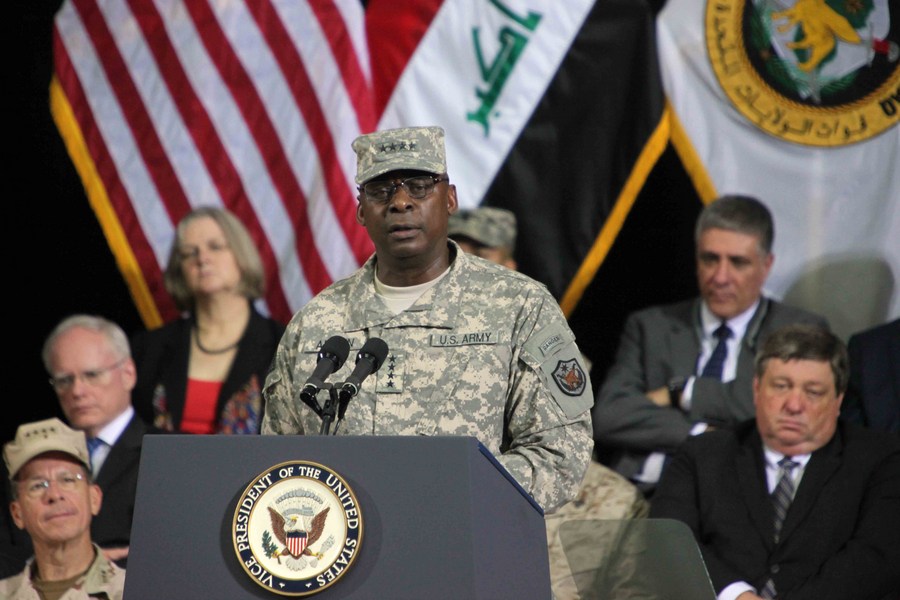
WASHINGTON -- The US Congress on Thursday approved a waiver for Lloyd Austin, a retired four-star general, to serve as President Joe Biden's defense secretary.
In a 69-27 vote, the Senate removed the final obstacle before the upper chamber votes on Austin's actual confirmation.
Earlier on Thursday, the House of Representatives easily passed the waiver in its own 326-78 vote. The Senate Armed Services Committee advanced both the waiver and Austin's nomination to the Senate floor.
Austin, 67, would be the first African American to run the Pentagon, the federal government's largest agency, if confirmed by the upper chamber.
Congress has to pass a waiver to allow Austin, who retired in 2016, to take the job, as a US law requires Pentagon chiefs to be out of the military for at least seven years.
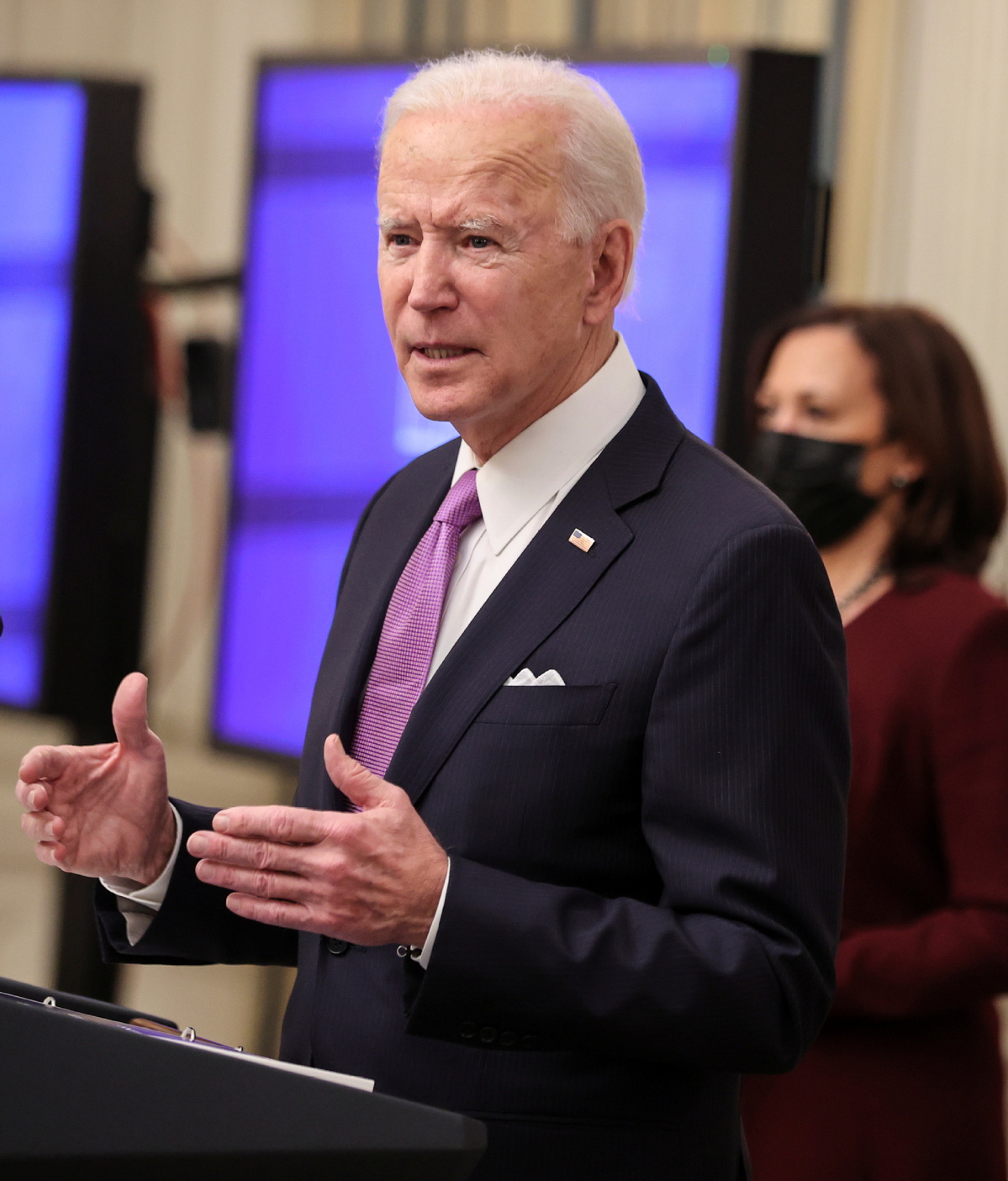
As incoming US President Joe Biden began signing executive orders to undo some of his predecessor Donald Trump's signature policies and took his first steps to address the pandemic, he said "There's no time to start like today.
Biden told reporters in the Oval Office as he began signing a stack of orders and memoranda, "I'm going to start by keeping the promises I made to the American people."
He signed 17 executive orders, memorandums and proclamations-the first he has endorsed to address the pandemic.
Biden imposed a national mandate requiring face masks and physical distancing in all federal buildings, on all federal land and by all federal employees.
He ended Trump's efforts to leave the WHO, sending Anthony Fauci, the US' top infectious disease specialist, to take part in the group's annual executive board meeting on Thursday.
Biden installed a coronavirus response coordinator-Jeff Zients-to oversee White House efforts to distribute vaccines and other medical supplies.
He reversed Trump's attempts to withdraw from international accords, beginning the process of rejoining the Paris agreement on climate change.
Biden also stopped funding for the construction of Trump's wall on the United States border with Mexico.
He signed an executive order revoking the Trump administration's plan to exclude noncitizens from the census count, and a second order aimed at bolstering the Deferred Action for Childhood Arrivals program that protects so-called Dreamers from deportation. Trump had sought for years to end the program, known as DACA.
Two Trump-era proclamations enforcing a ban on travel to the US from predominantly Muslim nations in Africa were ended.
Biden also directed the State Department to look for ways to address the harm caused to those prevented from traveling to the US due to the ban.
CNN reported seeing a calendar Biden plans to follow this month by centering each day on a specific theme. The White House did not confirm the report's accuracy.
According to CNN, on his first full day in office on Thursday, Biden would focus on the pandemic, while on Friday he would highlight his push for economic relief.
The report said the themes next week would include "Buy American", with an executive order on Monday increasing requirements for government purchases of goods and services from US companies.
Immigration would be the theme for Friday next week, when Biden plans to sign executive orders focusing on border processing and refugee policies, and also establish a family reunification task force.
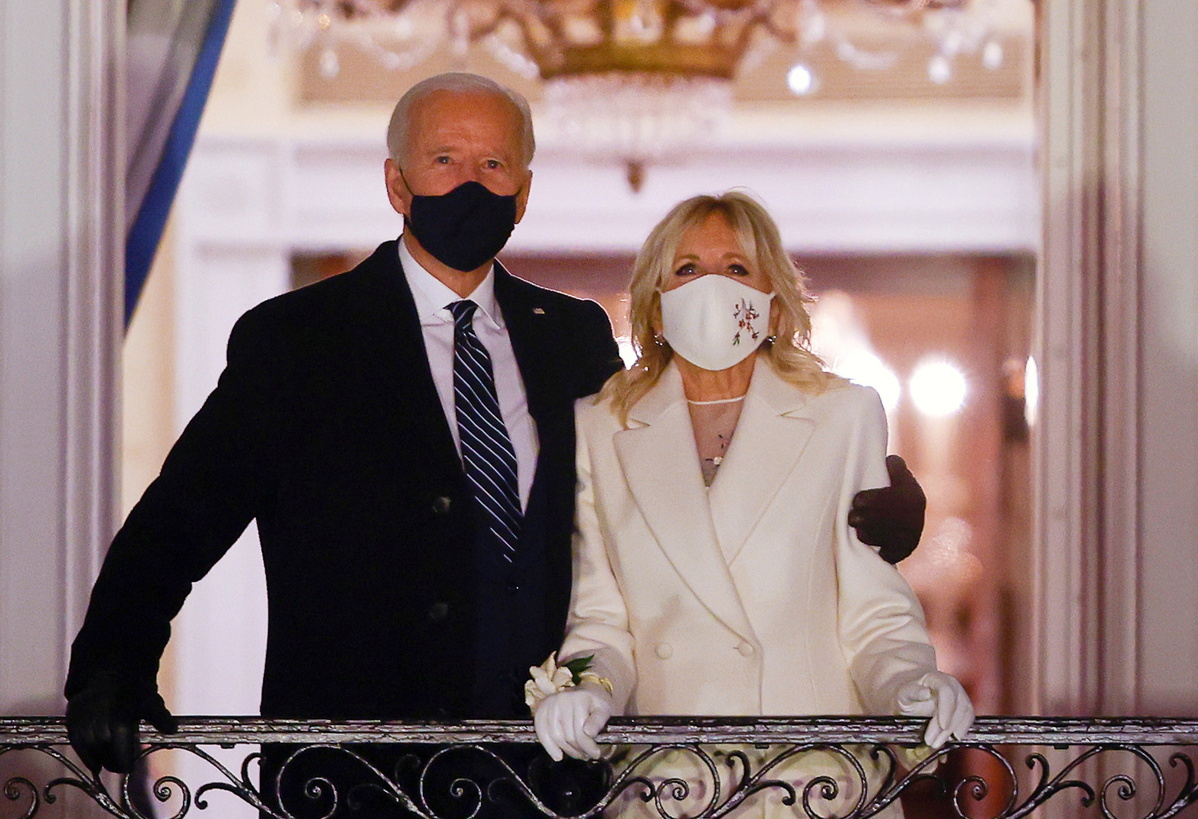
WASHINGTON - Hours after being sworn in as the 46th US president on Wednesday, Joe Biden signed a series of executive actions that reversed some of his predecessor Donald Trump's signature policies.
The 17 executive orders, memorandums and proclamations mainly fell within the four categories of the COVID-19 pandemic, economic fallout, immigration and diversity issues, and the environment and climate change.
"There is no time to waste when it comes to tackling the crises we face," Biden said in his first tweet as president.
Among the president's executive actions were a mask-wearing mandate on federal property, the start of a process to bring the United States back to the 2015 Paris Climate Accord the country exited under Trump, as well as a sweeping immigration overhaul to end the Muslim travel ban, the construction of the border wall, and the suspension of the DACA legislation that protected immigrants who came to the United States illegally during childhood.
Notably, Biden reversed the US process of withdrawing from the World Health Organization (WHO).
"Americans are safer when America is engaged in strengthening global health. On my first day as President, I will rejoin the @WHO and restore our leadership on the world stage," Biden tweeted in July when the former administration notified the United Nations (UN) of the United States' withdrawal from the WHO.
UN Secretary-General Antonio Guterres welcomed the United States' stated re-engagement with the WHO, said his spokesman.
Supporting the WHO is absolutely critical to the world's efforts for a better coordinated response against COVID-19, and now is the time for unity and for the international community to work together in solidarity to stop this virus and its shattering consequences, said Stephane Dujarric, the spokesman, in a statement.
Following Biden's moves, The New York Times reported that "his first actions in office were aimed not at compromise and cooperation with his adversaries, but instead suggested a determination to quickly erase much of the Trump agenda".
Yet, as most of the topics Biden covered are highly controversial in the country, such actions could leave the United States more divided, analysts said.
For instance, Biden signed an executive order to revoke the existing presidential permit for the controversial Keystone XL pipeline project, which would carry oil from Canada to the Gulf Coast.
Oil industry groups and Republicans in the United States opposed the move, arguing it would result in job losses and put energy security at risk. But environmental groups and Democrats praised Biden's decision, arguing the Keystone XL project would worsen climate change.
Meanwhile, "these actions are divisive and destructive -- and there's far more to come," Jessica Anderson, executive director of Heritage Action, a grassroots conservative organization, said when responding to Biden's first executive actions after his inauguration.
"As the Biden administration begins today, conservatives are prepared to fight back against the destructive policies of the far Left," Anderson said.

WASHINGTON - US President Joe Biden on Wednesday signed an executive order to revoke the existing presidential permit for the controversial Keystone XL pipeline project, which would carry oil from Canada to the American Gulf Coast.
Oil industry groups and Republicans in the United States opposed the move, arguing it would result in job losses and put energy security at risk. But environmental groups and Democrats praised Biden's decision, arguing the Keystone XL project would worsen climate change.
"President Biden hit the ground running on the strongest White House climate plan ever, with executive action to rejoin the landmark Paris climate agreement, reject the dirty tar sands pipeline," Mitchell Bernard, president of the Natural Resources Defense Council, said Wednesday in a statement.
"It makes the United States once more part of the global climate solution-not the problem. It makes clear that the country is moving away from dirty fossil fuels and toward cleaner, smarter ways to power our future," Bernard said.
TC Energy Corporation, a Canadian company behind the Keystone XL project, said earlier Wednesday that "advancement of the project will be suspended" in anticipation of Biden's order.
"TC Energy will review the decision, assess its implications, and consider its options," the company said in a statement, noting revoking the permit for the project would "directly lead to the layoff of thousands of union workers".
Following the order, Canadian Prime Minister Justin Trudeau said that "we are disappointed but acknowledge the President's decision to fulfil his election campaign promise on Keystone XL".
"I look forward to working with President Biden to reduce pollution, combat climate change, fight COVID-19, create middle class jobs, and build back better by supporting a sustainable economic recovery for everyone," Trudeau said in a statement.
The Keystone XL project was rejected by former President Barack Obama in 2015. Former President Donald Trump reversed the decision in 2017 and granted a presidential permit to build the pipeline.
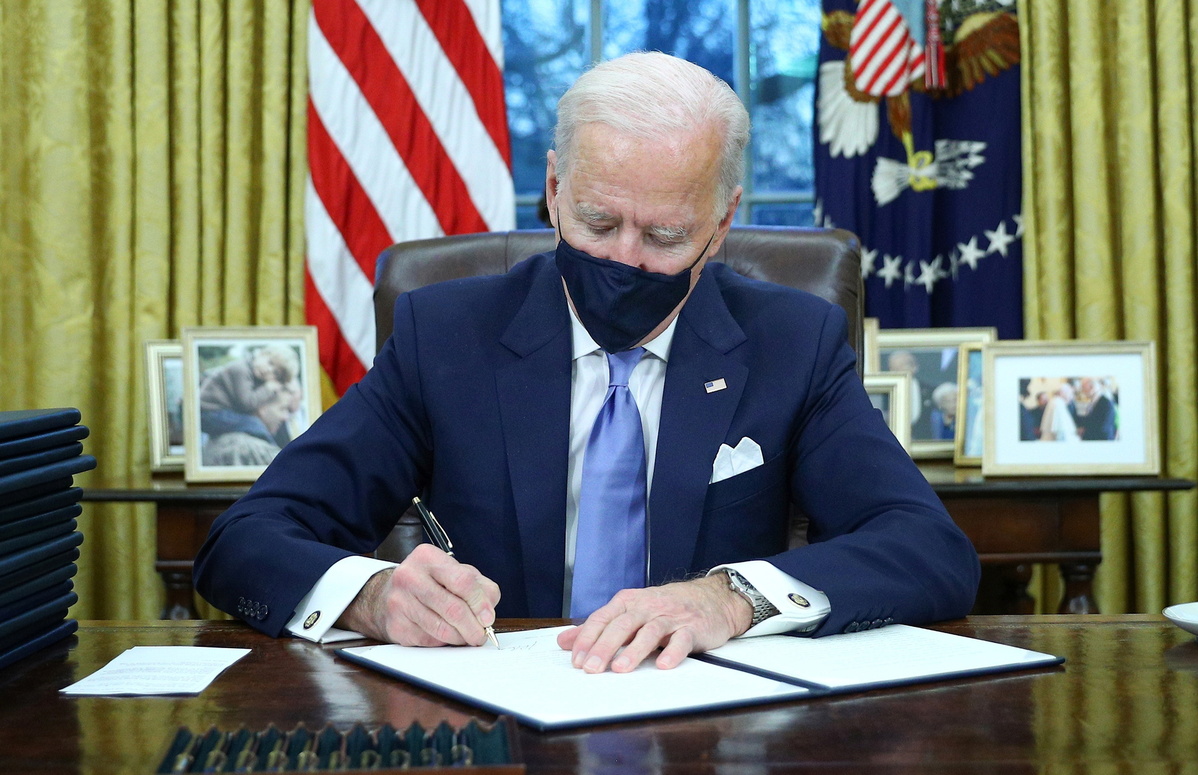
Hours after he was sworn in on Wednesday, President Joe Biden signed executive orders to undo some of former president Donald Trump's signature policies and took his first steps to address the COVID-19 pandemic in the country.
"There's no time to start like today," Biden told reporters in the Oval Office as he began signing a stack of orders and memoranda. "I'm going to start by keeping the promises I made to the American people."
Biden signed 17 executive orders, memorandums and proclamations; the first ones he signed address the coronavirus pandemic.
He imposed a national mandate requiring face masks and physical distancing in all federal buildings, on all federal lands and by all federal employees.
The president ended Trump's efforts to leave the World Health Organization, sending Dr Anthony Fauci, the nation's top infectious disease specialist, to participate in the group's annual executive board meeting on Thursday.
Biden installed a coronavirus response coordinator — Jeff Zients — to oversee the White House's efforts to distribute vaccines and medical supplies and reporting to the president.
He reversed Trump's attempts to withdraw from international agreements, beginning the process of rejoining the Paris Agreement on the climate.
Biden stopped funding for the construction of Trump's wall on the border with Mexico.
He signed an executive order revoking the Trump administration's plan to exclude noncitizens from the census count, and a second order aimed at bolstering the Deferred Action for Childhood Arrivals program that protects "Dreamers" from deportation. Trump had sought for years to end the program, known as DACA.
Two Trump-era proclamations that established a ban on travel to the United States from several predominantly Muslim and African countries were ended.
The president also directed the State Department to develop ways to address the harm caused to those prevented from coming to the US because of the ban.
CNN reported that it saw a calendar that Biden plans to follow by centering each day of January on a specific theme. The White House didn't confirm the accuracy of what CNN said the calendar showed.
Thursday, Biden's first full day in office, will be focused on the coronavirus pandemic, and Friday will highlight his push for economic relief, according to CNN.
The themes next week will include "Buy American", with a Monday executive order increasing requirements for government purchases of goods and services from US companies; immigration will be the theme on Friday when Biden plans to sign executive orders focused on border processing and refugee policies and establish a family reunification task force.
February will focus on what's identified in the calendar document as "restoring America's place in the world".
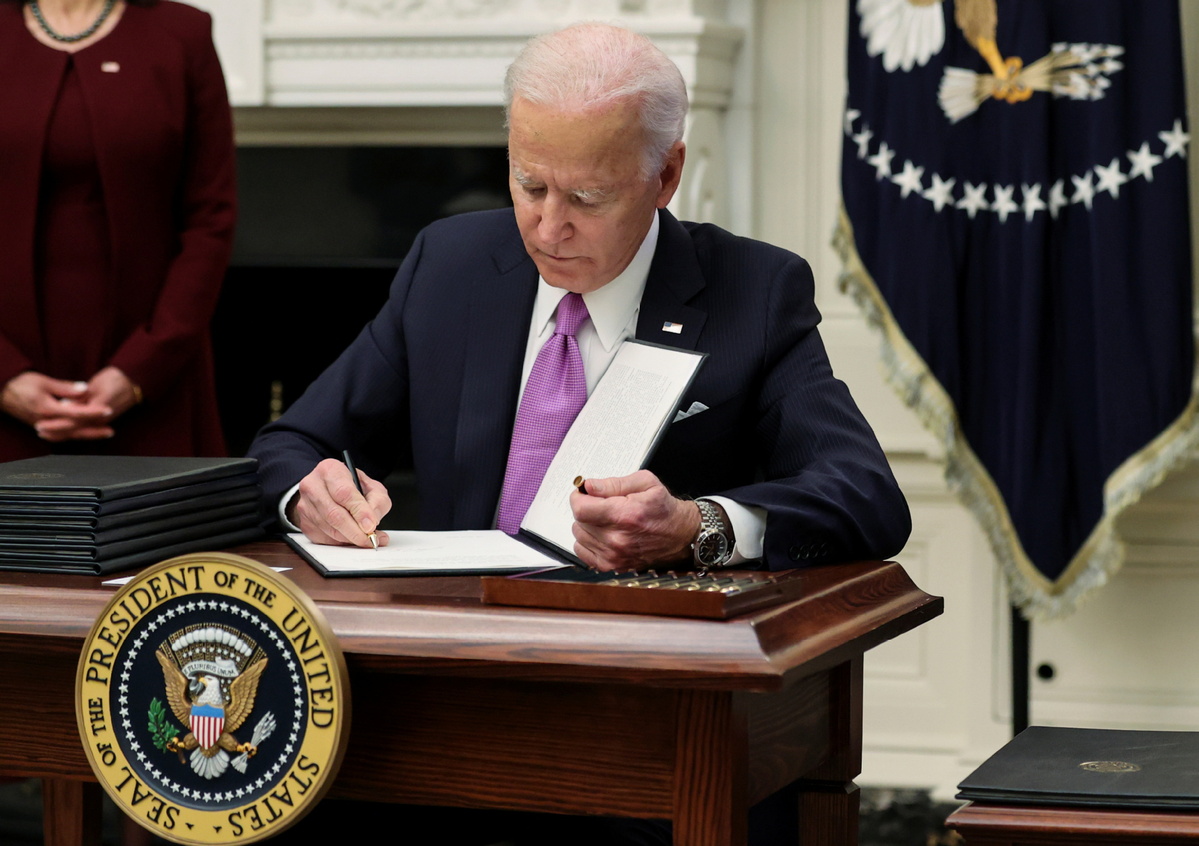
Newly sworn-in United States President Joe Biden moved swiftly on his first day in the White House to roll back major policy decisions made by his predecessor, Donald Trump.
Just hours after his inauguration at noon on Wednesday, Biden signed executive orders to begin the process of returning the US to the Paris agreement on climate change, which the Trump administration left in November.
He also acted to reverse the process of the country leaving the World Health Organization, which is coordinating the global fight against the novel coronavirus pandemic.
In a congratulatory message to Biden, Chinese Ambassador to the US Cui Tiankai said China would cooperate with the US in dealing with pressing challenges facing the world.
"China looks forward to working with the new administration to promote sound and steady development of China-US relations and jointly address global challenges in public health, climate change and growth," Cui tweeted on Wednesday.
Biden's decisions on the Paris agreement and the WHO, which followed a pledge in his inaugural address to "engage with the world again", have fueled hope for renewed international cooperation in the fight against global warming and the pandemic.
"A cry for survival comes from the planet itself, a cry that can't be any more desperate or any more clear now," Biden said in his inauguration remarks, listing "a climate in crisis" and "a raging virus" as the major challenges for the country.
Former Colombian president and Nobel Peace Prize winner Juan Manuel Santos said Biden "understands the value and the importance of multilateralism. He understands the importance of cooperation among nations."
"If we don't cooperate-all nations-to fight climate change, then we will all perish. It's as simple as that," Santos was quoted as saying by The Associated Press.
Biden, who was vice-president during the Obama administration which signed the 2015 Paris agreement on climate change, campaigned on tackling what he called "the existential threat".
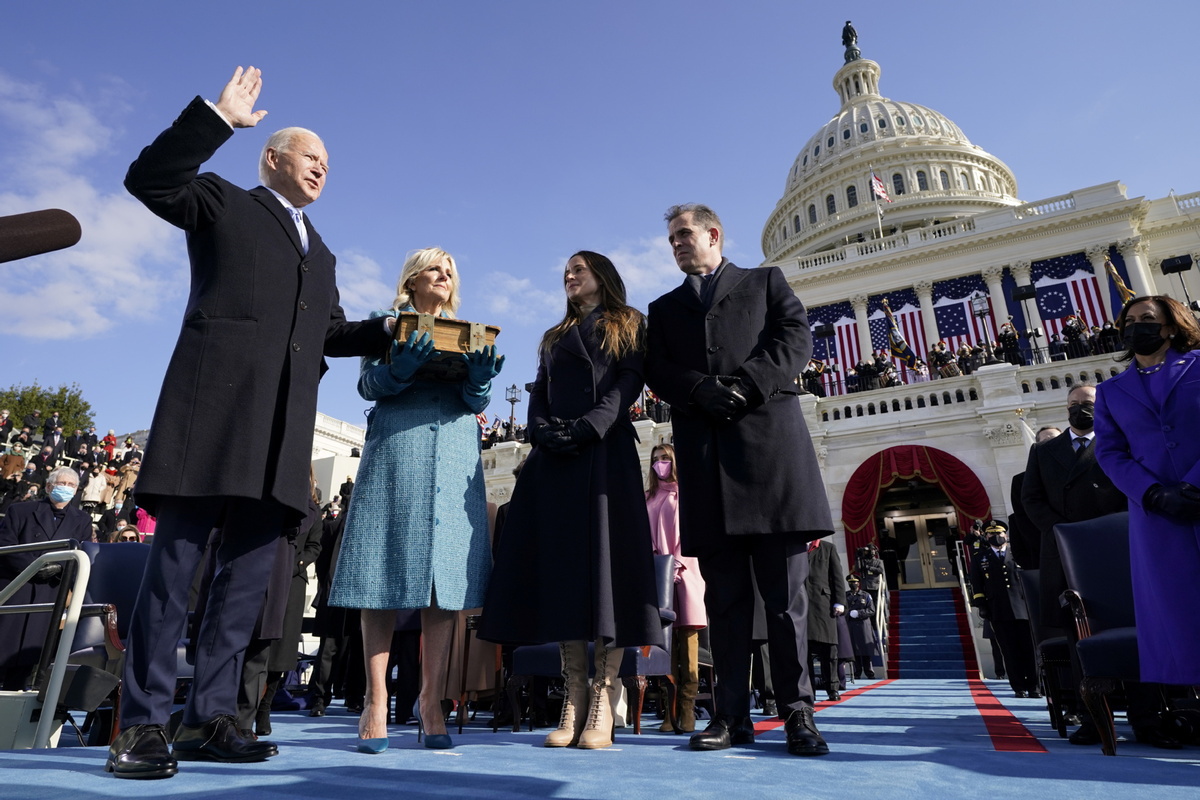
While Trump cited concerns about the agreement's risk to the US economy when he announced the withdrawal soon after taking office in 2017, Biden told voters climate efforts add to the number of well-paid jobs and boost the economy.
"We are going to combat climate change in a way we have not done so far," he said on Wednesday, before signing the executive order, one of a flurry of actions taken to reverse Trump administration policies.
In an article he wrote for Foreign Affairs magazine in April, Biden said he planned to "make massive, urgent investments at home that put the United States on track to have a clean energy economy with net-zero emissions by 2050."
He also vowed to rally nations to "raise their ambitions and push progress further and faster".
Rachel Cleetus, climate and energy policy director for the Union of Concerned Scientists, said the new US administration's swift action to rejoin the Paris agreement would be the first step to bring the country back into the fold of the global community after four years of being isolated and on the sidelines.
Cleetus suggested in a statement that Biden and his international climate envoy, John Kerry, hold bilateral and multilateral discussions with other major emitting countries to solidify ways to collectively tackle the climate crisis head on.
Kerry has already said he expects to work with China on climate change.
"They (China) were a partner on climate as we competed with them at other things during the Obama administration," Kerry said in an interview with National Public Radio last month when asked if he could collaborate with China on climate issues as the two countries compete on others.
"We've been there, done that. But if we don't work as a primary extraordinary effort on climate, we're all cooked," the former US secretary of state said.
The actions Biden signed on Wednesday also included an order to establish a new White House office coordinating response to the pandemic and ending the process of withdrawing from the WHO.
As of Wednesday, more than 405,000 people had died from COVID-19 in the US, according to Johns Hopkins University.
UN Secretary-General Antonio Guterres said in a statement, "I warmly welcome President Biden's steps to re-enter the Paris agreement on climate change and join the growing coalition of governments, cities, states, businesses and people taking ambitious action to confront the climate crisis."
Guterres said he believed this action was "absolutely critical" for a better coordinated global response to COVID-19.
The Washington State China Relations Council said it was pleased to see that the US would return to the Paris agreement, and hoped the new administration would work with international partners, including China, to address climate change and the spread of COVID-19, among other issues.
"We also hope that President Biden's team will lend its support to global institutions which have endured limited American attention over the past four years," the organization said in a statement.
UN spokesman Stephane Dujarric said, "With vaccines being a critical tool in the battle against COVID-19, the United States joining and supporting the COVAX facility will give momentum to efforts to ensure equitable access to vaccines for all countries."
According to US media reports, the Biden administration intends to join the COVAX alliance, a global initiative launched by the WHO to ensure equitable worldwide access to COVID-19 vaccines.
China joined the initiative in October.
John Allen, president of the Brookings Institution, has said Washington and Beijing could work together to step up inoculations worldwide against the disease and to cope with climate change.
"Here is an opportunity for the United States and China to exert leadership with our partners to find a way forward to vaccinate the planet and then to create a system of global medical surveillance that will preclude this from happening again," Allen said in a podcast aired on Jan 4, after listing vaccine development in both countries.
Ryan Hass, a senior fellow at the Brookings John L. Thornton China Center, noted that the joining of the US and China in the COVAX alliance could provide "a more frictionless" platform to coordinate contributions to global efforts to deliver more than 11 billion vaccine treatments to people on every continent than if they attempted to replicate COVAX's efforts on a bilateral basis.
Professor at the USC Price School of Public Policy at the University of Southern California, Eric J. Heikkila, said that while Biden's message was addressed primarily to "his Americans", he also spoke to "those beyond our borders", pledging to be "a strong and trusted partner for peace, progress and security".
"This will no doubt create an opportunity for improved relations between China and the US, provided that China responds in a similar spirit," Heikkila said.
"In some policy domains, such as climate change or even pandemic response, this should be doable," he added.
Liu Yinmeng in Los Angeles and Linda Deng in Seattle contributed to this story.
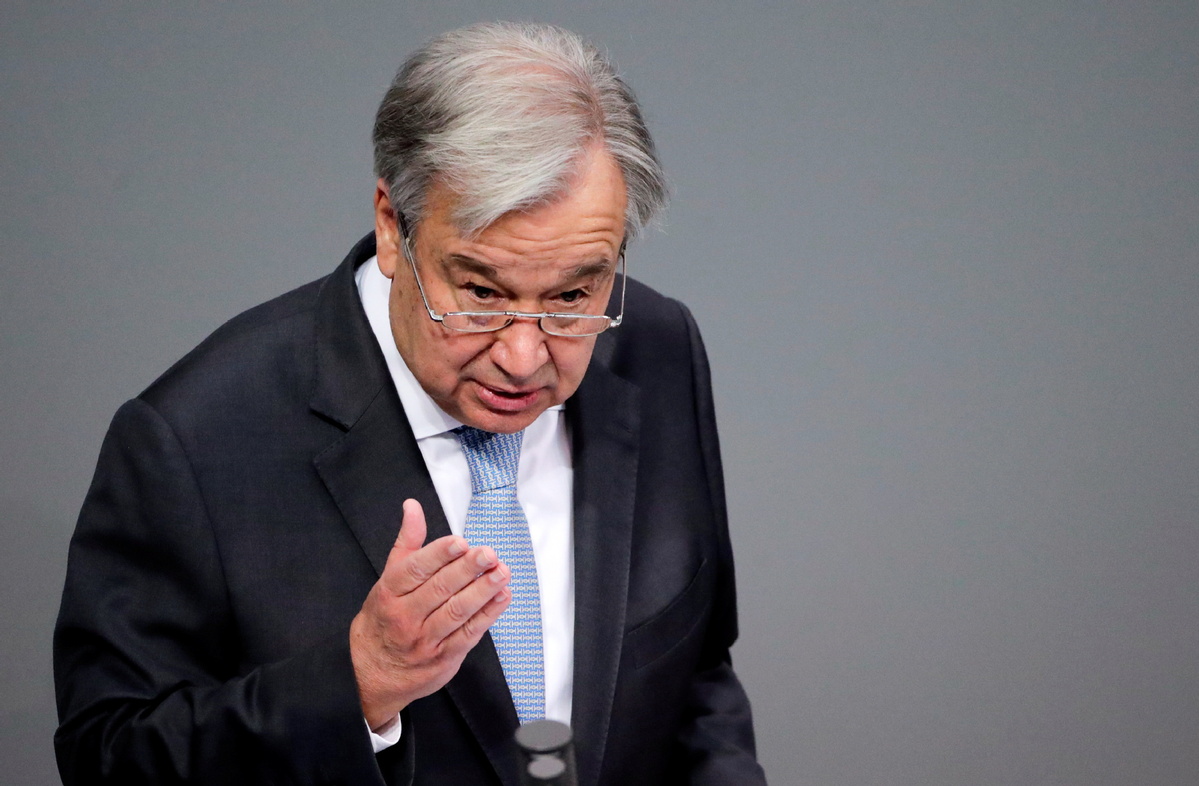
UNITED NATIONS - UN Secretary-General Antonio Guterres on Wednesday welcomed the positive steps announced by the new US administration relating to migration and refugees, said his spokesman.
The secretary-general looks forward to working with the new US administration led by Joe Biden to strengthen multilateral cooperation in these areas. Guterres also hopes to see the United States join the Global Compact for Migration, said Stephane Dujarric, the spokesman, in a statement.
"Support from the United States to address the needs of migrants and refugees has been strong and steadfast. This partnership is needed now more than ever as we seek to provide assistance, protection and sustainable solutions to the displacement of record numbers of people who have been forced to flee their homes as a result of conflict, violence or disaster, or are migrating in the hopes of finding a better life for themselves and their families," said the statement.
Just hours after taking the oath of office, Biden acted to dismantle his predecessor Donald Trump's immigration policies. Biden ordered an end to the construction of the US-Mexico border wall and a ban on travel from some Muslim-majority countries. The Biden administration also aims to provide a pathway to citizenship for immigrants who are living in the United States unlawfully.
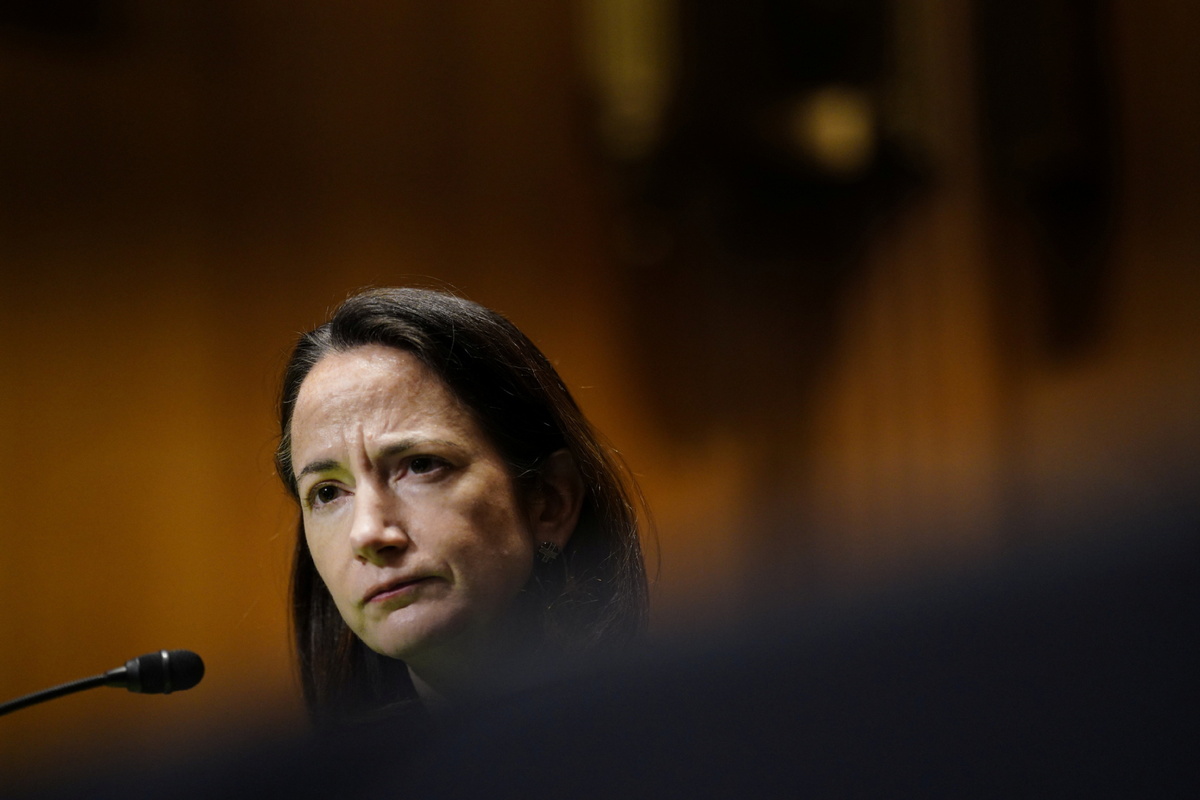
WASHINGTON - US Senate voted to confirm Avril Haines as director of National Intelligence hours after President Joe Biden officially took office on Wednesday.
The Senate confirmed Haines by a vote of 84-10, making her the first member of Biden's cabinet to be installed by the chamber.
Haines, 51, will become the first woman in history to lead the intelligence community.
She served as a principal deputy national security adviser and as a deputy director at the Central Intelligence Agency under the Obama Administration.
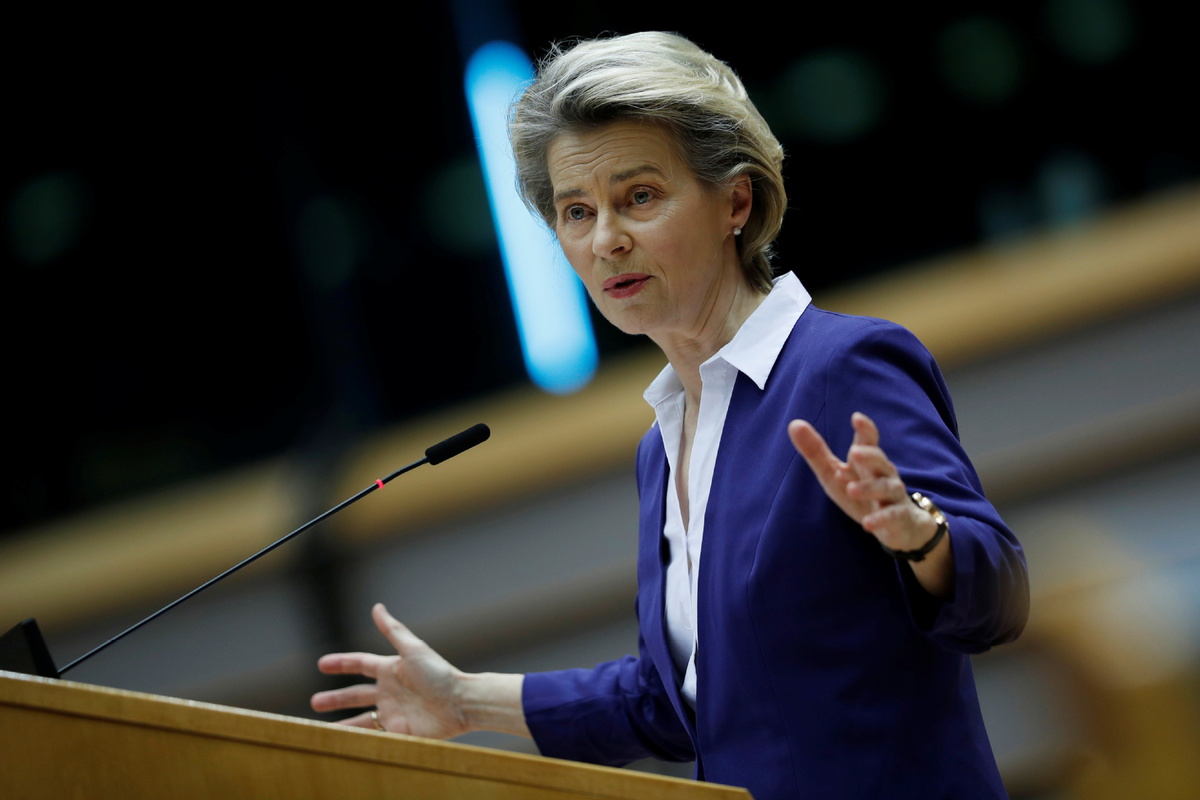
BRUSSELS - Top officials of the European Union (EU) rejoiced on Wednesday over the inauguration of the new administration of the United States, expressing their readiness to mend the broken partnership and laying out expectations for renewed transatlantic cooperation.
"Today is a very special day. I am ready to present to President Joe Biden our proposals for a new transatlantic agenda," said European Commission President Ursula von der Leyen on Twitter.
She posted a video, in which she addressed the European Parliament early on Wednesday, saying that "there is no greater need for global cooperation in the short term than in tackling the pandemic, which has been so devastating on both sides of the Atlantic."
Von der Leyen said she was delighted to know that "on day one, as they announced, the new American administration, the United States, will rejoin the Paris Agreement" on climate change.
Charles Michel, president of the European Council, appeared along with von der Leyen at the European Parliament's plenary. He said: "Today is the opportunity to rejuvenate our transatlantic relationship, which has greatly suffered in the last four years."
Michel called on the two sides to work on five priorities, which are boosting multilateral cooperation, combating COVID-19, tackling climate change, rebuilding economies while promoting a digital transformation; and joining forces on security and peace.
He invited Biden to participate in an extraordinary European Council session in Brussels. Without giving the exact schedule, he suggested it could take place in parallel with a NATO (North Atlantic Treaty Organization) summit.
NATO Secretary-General Jens Stoltenberg said in November 2020 that he would invite Biden to attend the next NATO summit set for 2021.
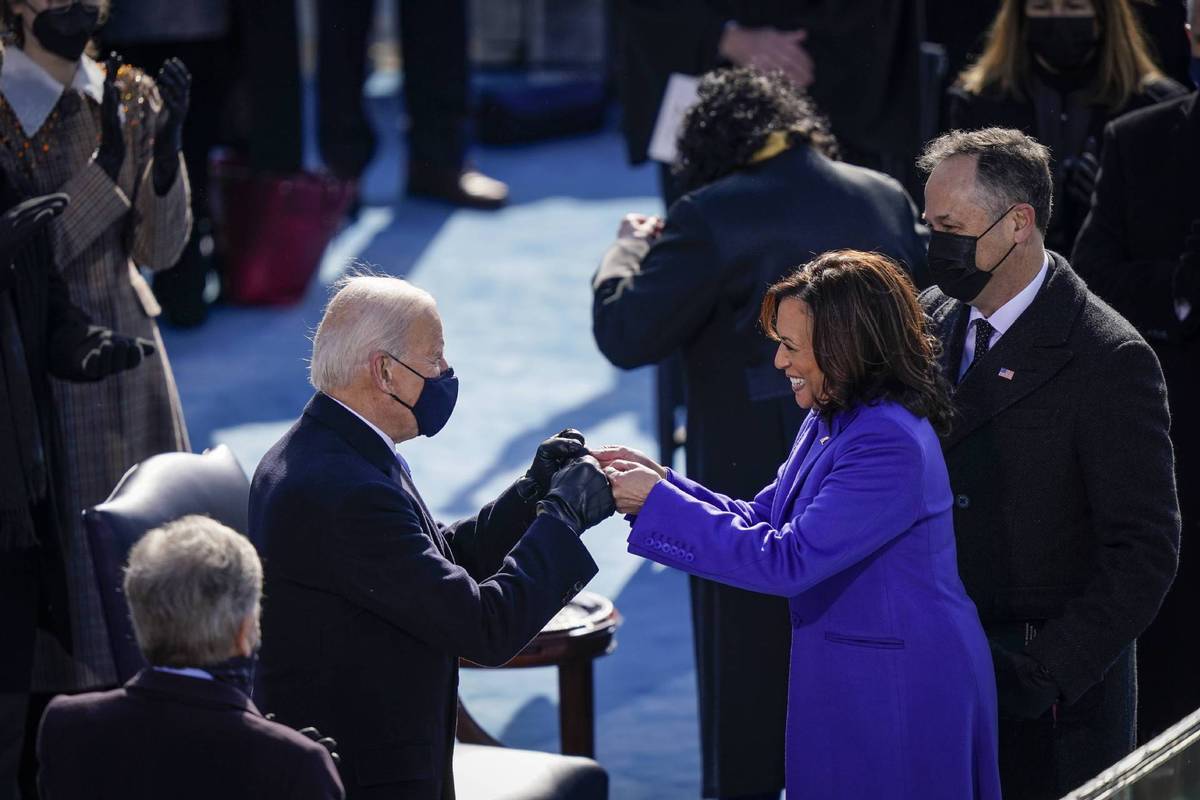
WASHINGTON - The Democratic Party became the majority party in the US Senate on Wednesday after Vice President Kamala Harris swore in three Democrats as new members of the upper chamber.
Stepping onto the Senate floor for the first time as vice president of the United States -- thus president of the Senate -- Harris swore in Jon Ossoff and Raphael Warnock from Georgia, as well as her replacement from California, Alex Padilla.
The party breakdown in the Senate is 50-50 now, with Harris having the power to cast the tie-breaking vote.
Warnock, 51, and Ossoff, 33, won runoff elections in Georgia earlier this month that determined the control of the Senate. Padilla, 47, was picked by California Governor Gavin Newsom to fill Harris's Senate seat when she resigned to become vice president.
Meanwhile, Democratic leader in the chamber, Chuck Schumer, became the Senate majority leader. "We have a lengthy agenda, and we need to get it done together ... This will be an exceptionally busy and consequential period for the United States Senate," he said in the first speech in his new role.
"The divisions in the country are real. We have no choice but to try to work together every day," Schumer said in remarks to Republican senators.
Mitch McConnell of the Republican Party became the minority leader. Schumer and McConnell will have to reach a power-sharing deal in the coming weeks on how the business of the Senate will be run, with issues remaining to be resolved including the number of senators each party will have on committees and the mechanism to break ties in the panels.
McConnell in a floor speech noted Joe Biden, who was sworn in as the 46th president of the United States earlier in the day, "made unity the major thing of his inaugural address," acknowledging that both Biden and Harris are alumni of the Senate and pledging cooperation with the new president "wherever possible."
The Democrats have now controlled the White House, the Senate and the House, but the evenly-shared senate seats and the shrinking majority they have in the House -- the slimmest in decades -- show just how divided the country is.
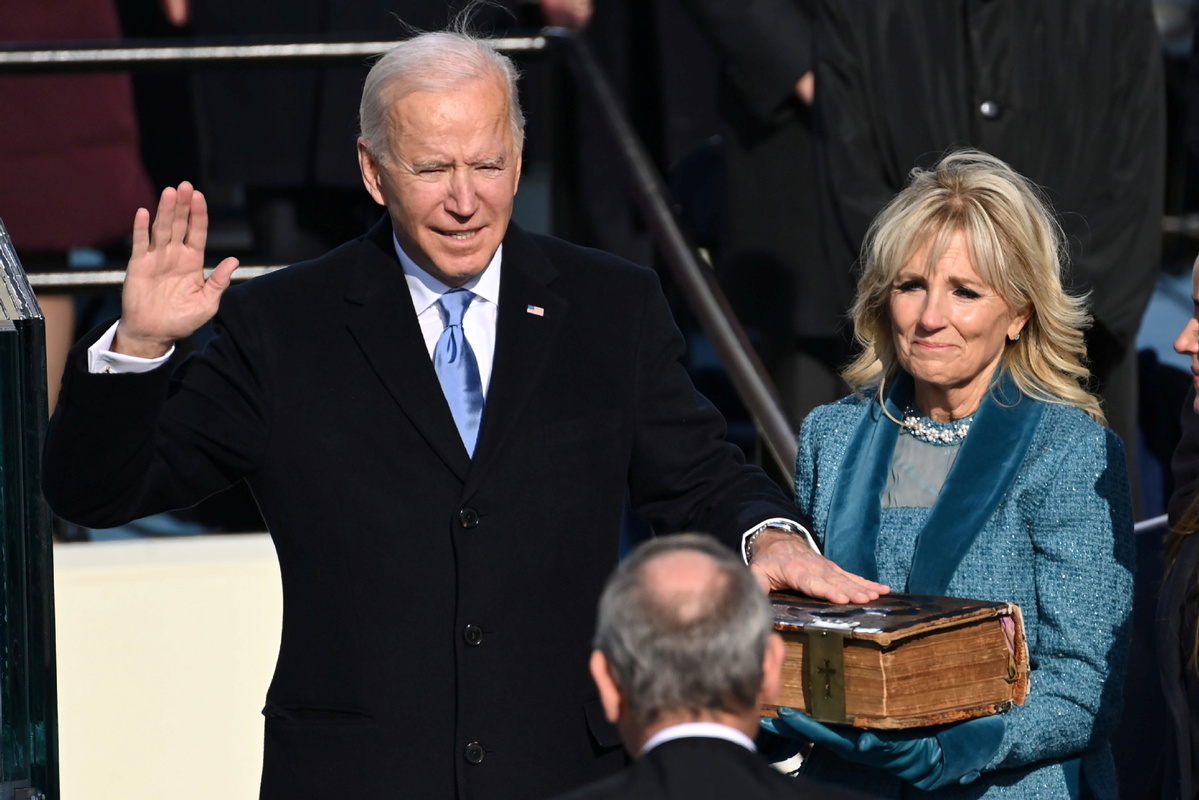
In his inauguration speech as the 46th president of the United States on Wednesday, Joe Biden vowed to tackle the unprecedented challenges from the raging novel coronavirus and growing inequality to the climate crisis and US global role.
He appealed for national unity in a sharply divided nation and said there is "much to repair, much to restore, much to heal, much to build and much to gain". He also urged Americans to set aside politics and face the pandemic as one nation and suggested people should show a little tolerance and humility and stand in the other person's shoes.
Internationally, Biden said that "we will repair our alliances, and engage with the world once again".
Biden was indeed sworn in at an extremely tough time after four years of the destructive Donald Trump presidency.
It is commendable for Biden to spend the first day signing executive orders and taking actions to undo and reverse Trump's harmful and inhumane policies by rejoining the Paris climate accord and lifting the notorious Muslim ban.
The to-do list is long for the coming days and months. And it should include correcting Trump's disastrous policies on China, such as the punitive tariffs, war on Chinese tech companies, and fearmongering of the Confucius Institute, to name just a few.
A recent report by the US-China Business Council and Oxford Economics shows that merely relaxing the tariffs imposed during Trump's trade war would greatly help the US economy and employment, which took a major hit during the pandemic.
The report warns that if the US continues its bid to separate its markets from China, the US economy would produce $1.6 trillion less in real GDP terms over the next five years, 732,000 fewer jobs in 2022 and 320,000 fewer jobs in 2025.
Biden's many domestic calls such as for unity and reconciliation could be extended internationally, where global solidarity is badly needed in fighting climate change, the pandemic, nuclear proliferation, global economic recovery and global governance.
Without the two largest economies working together, it is hard to imagine that any of these major global challenges would be dealt with successfully.
There is no doubt that some major differences exist between China and the US, as they always do in the past decades, but the many mechanisms of high-level dialogues abandoned by the Trump administration had proved far more effective in solving issues and managing differences than the unilateral policies in the past years.
Biden and many of his appointees had served in the Barack Obama administration and know well the value of expanding China-US engagement, such as by re-inviting China to the Rim of Pacific multilateral naval war drills. Military-to-military exchanges are essential to avoid accidents and ensure peace and stability in the South China Sea where the two militaries often encounter one another.
Biden should make a decisive move to halt the new Cold War efforts by the previous administration. Countries in Asia, Europe, Africa and Latin America, including key US allies, have all made it crystal clear that they don't want to be forced to choose sides between China and the US.
None of these will be easy given the bitter US partisan politics and revived McCarthyism in the past years. It takes courage since China hawks will make noise. Yet the best time to act is now given that the Democrats control both chambers of the Congress.
As Chinese leaders said, a peaceful and harmonious bilateral relationship will make both China and US winners, while a confrontational one will make both losers. That is also true for the rest of the world.
Stable and constructive China-US relations will help Biden to effectively deal with many of the key challenges he highlighted in the inaugural speech.
The author is chief of China Daily EU Bureau based in Brussels. chenweihua@chinadaily.com.cn
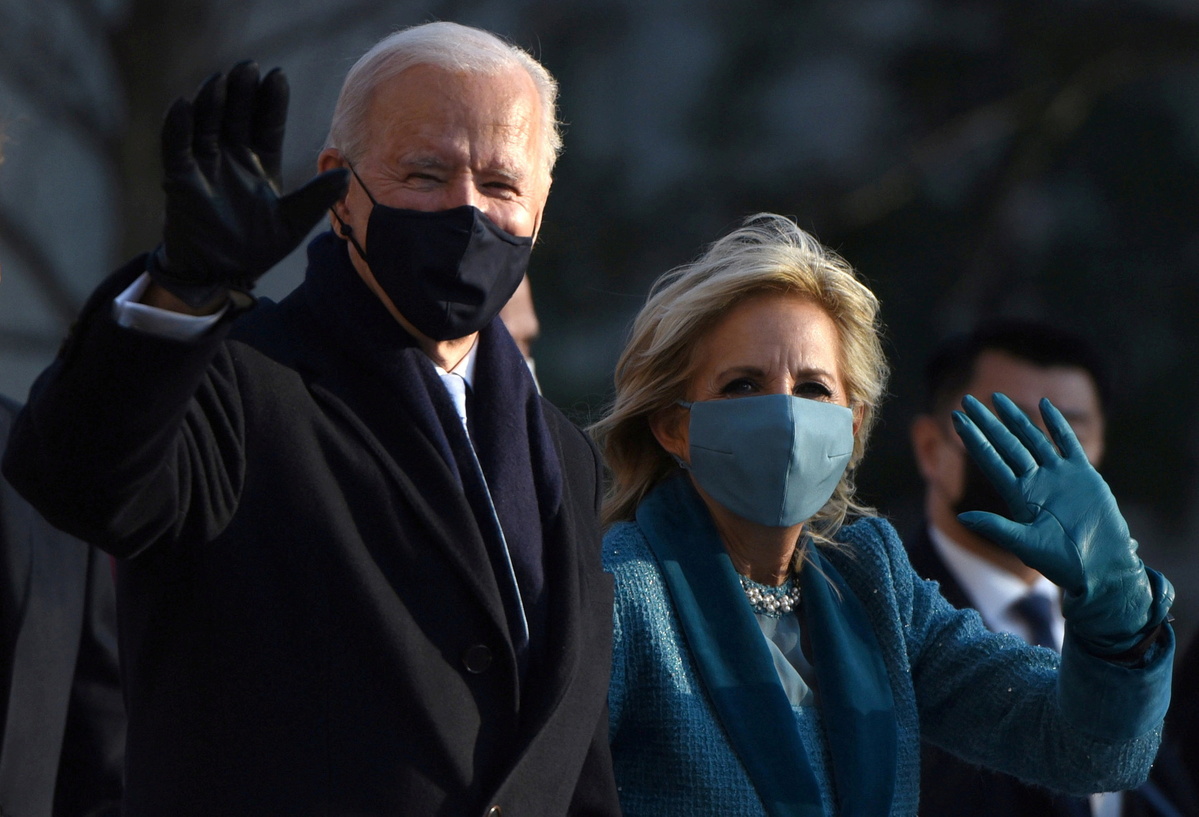
WASHINGTON - US President Joe Biden on Wednesday reversed the US process of withdrawing from the World Health Organization (WHO).
Hours after being sworn in as the 46th president of the United States, Biden signed an executive order ceasing a withdrawal process that his predecessor Donald Trump initiated last year.
"Americans are safer when America is engaged in strengthening global health. On my first day as President, I will rejoin the @WHO and restore our leadership on the world stage," Biden tweeted in July when the former administration notified the United Nations of withdrawal from the WHO.
According to media reports, Biden picked Anthony Fauci, the nation's top infectious disease expert, to lead a US delegation at the WHO's annual meetings later this week.
Trump and his administration had repeatedly assailed the WHO. Experts and Democrats had criticized that the Trump administration was trying to shift blames for its mishandling of COVID-19 response and would be counterproductive to addressing the public health crisis.
The United States has registered more than 24.4 million confirmed COVID-19 cases with related deaths exceeding 405,000 as of Wednesday afternoon, showed a tally by Johns Hopkins University.
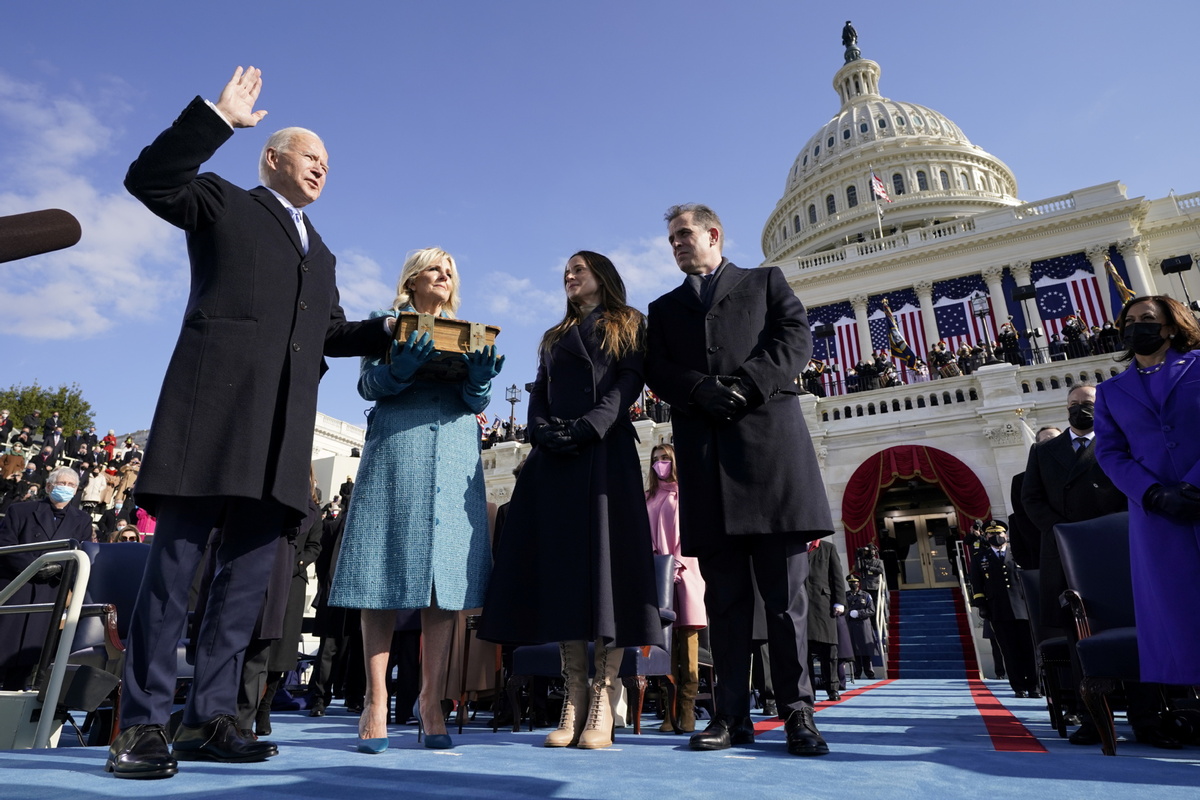
In his inaugural address, Biden said few people in the country's history have been "more challenged, or found the time more challenging or difficult', and there is "much to repair, much to restore, much to heal much to build and much to gain".
"I asked every American to join me in this cause to fight the foes we face -- anger, resentment and hatred, extremism, lawlessness, violence, disease, joblessness and hopelessness -- with unity," President Biden said.
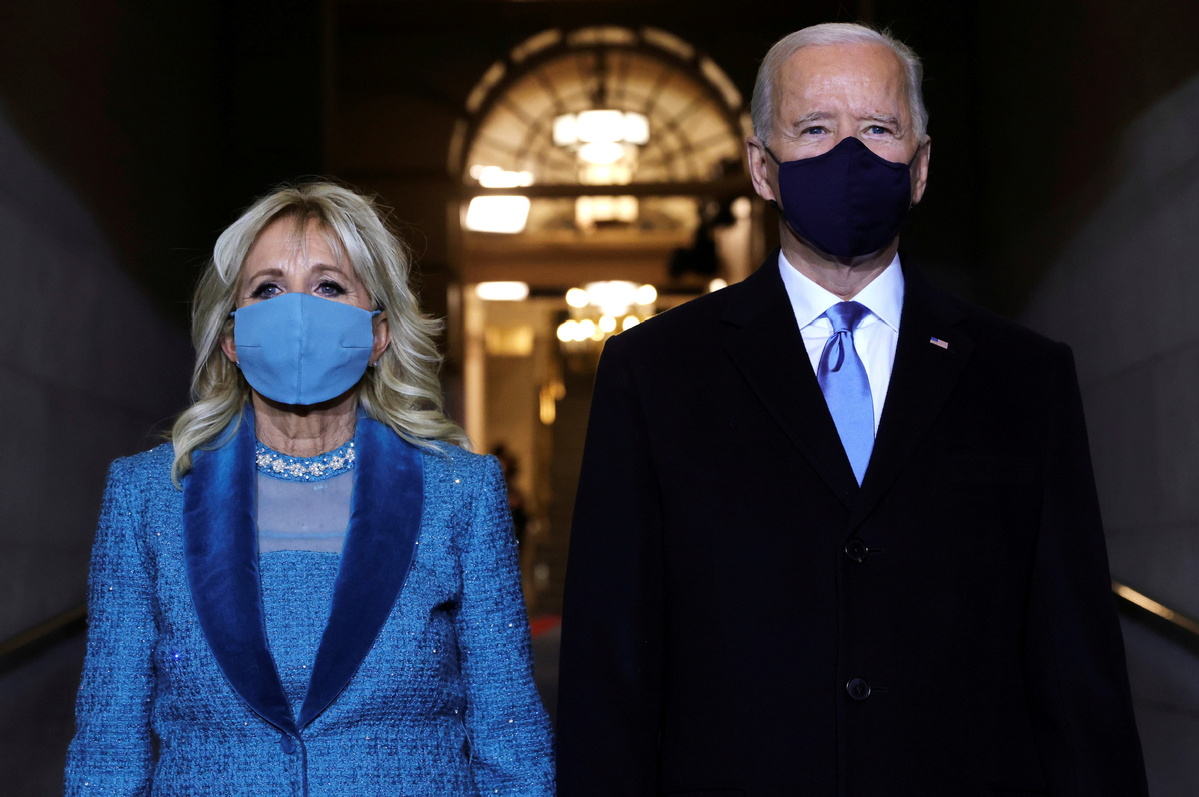
Joe Biden,78, took the oath of office at noon Wednesday to become the 46th President of the United States. He is the oldest president inaugurated.
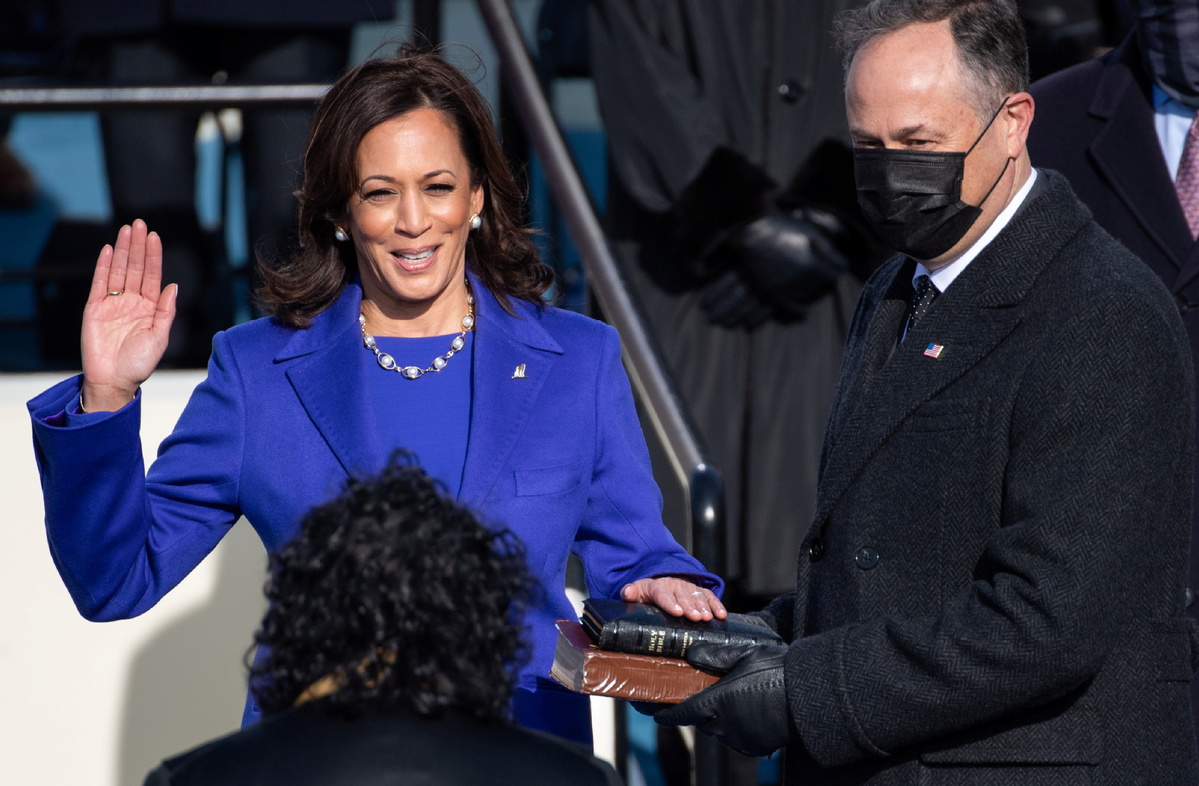
Kamala Harris, 56, makes history as she was sworn in to be the first woman to be vice-president of the United States. The former US senator from California is also the first Black person and the first person of South Asian descent elected to the post.
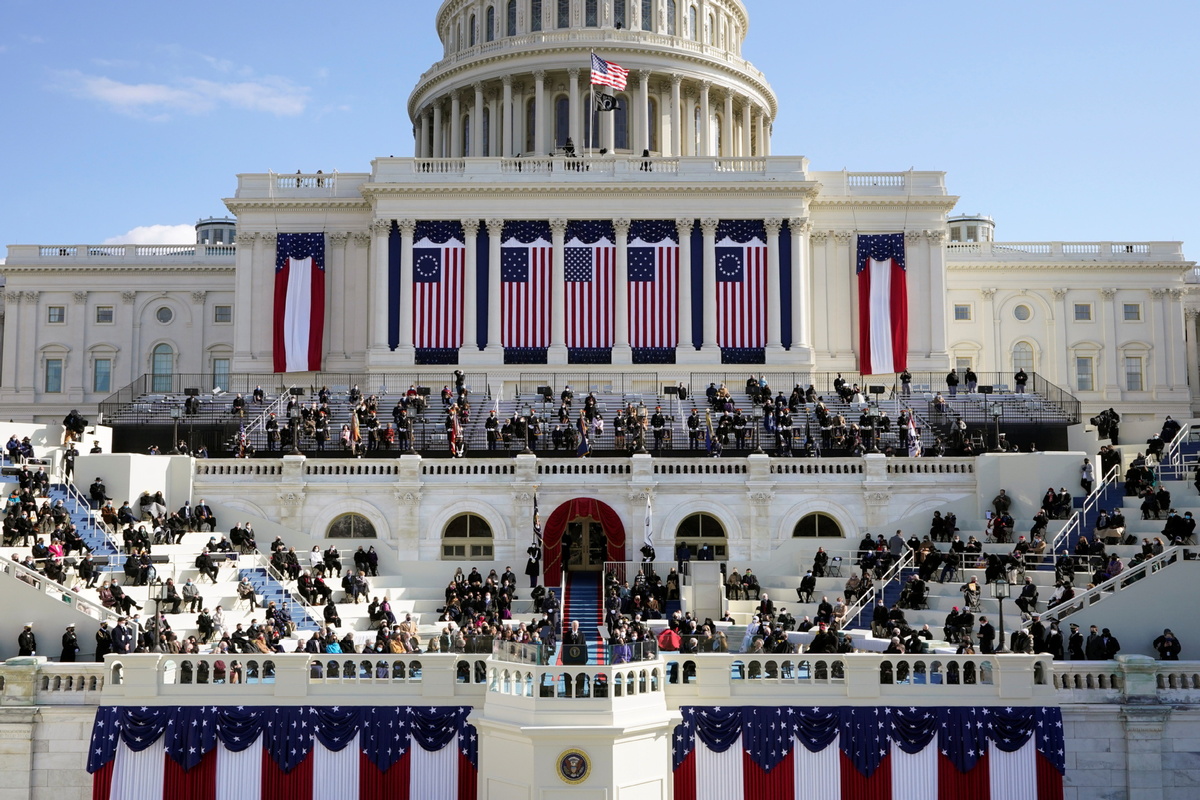
Joe Biden's presidential inauguration ceremony has begun
Biden swears the oath of office at noon Wednesday, becoming the 46th president of the United States. The Democrat is preparing to take the helm of a deeply divided nation and inherit crises arguably greater than any faced by his predecessors.
History will be made at Biden's side, as Kamala Harris becomes the first woman to be vice president.
The ceremony in which presidential power is transferred is a hallowed American democratic tradition. And this time it serves as a jarring reminder of the challenges Biden faces: The inauguration unfolds at a US Capitol battered by an insurrectionist siege just two weeks ago, encircled by security forces. It's devoid of crowds because of the threat of the coronavirus pandemic.
Flouting tradition, Donald Trump departed Washington on Wednesday morning ahead of the inauguration rather than accompany his successor to the Capitol.
Former Presidents George W. Bush, Barack Obama and Bill Clinton are attending.
The other living former president, 96-year-old Jimmy Carter, previously announced he would not attend.
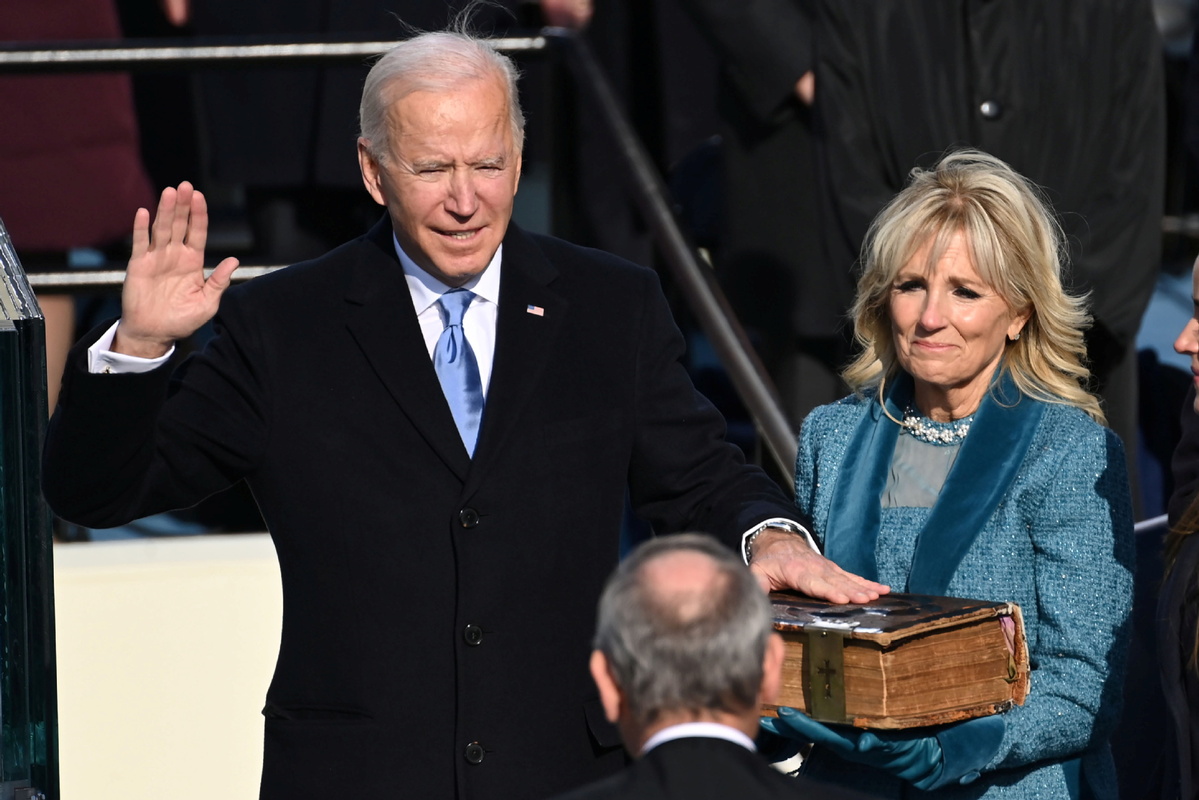
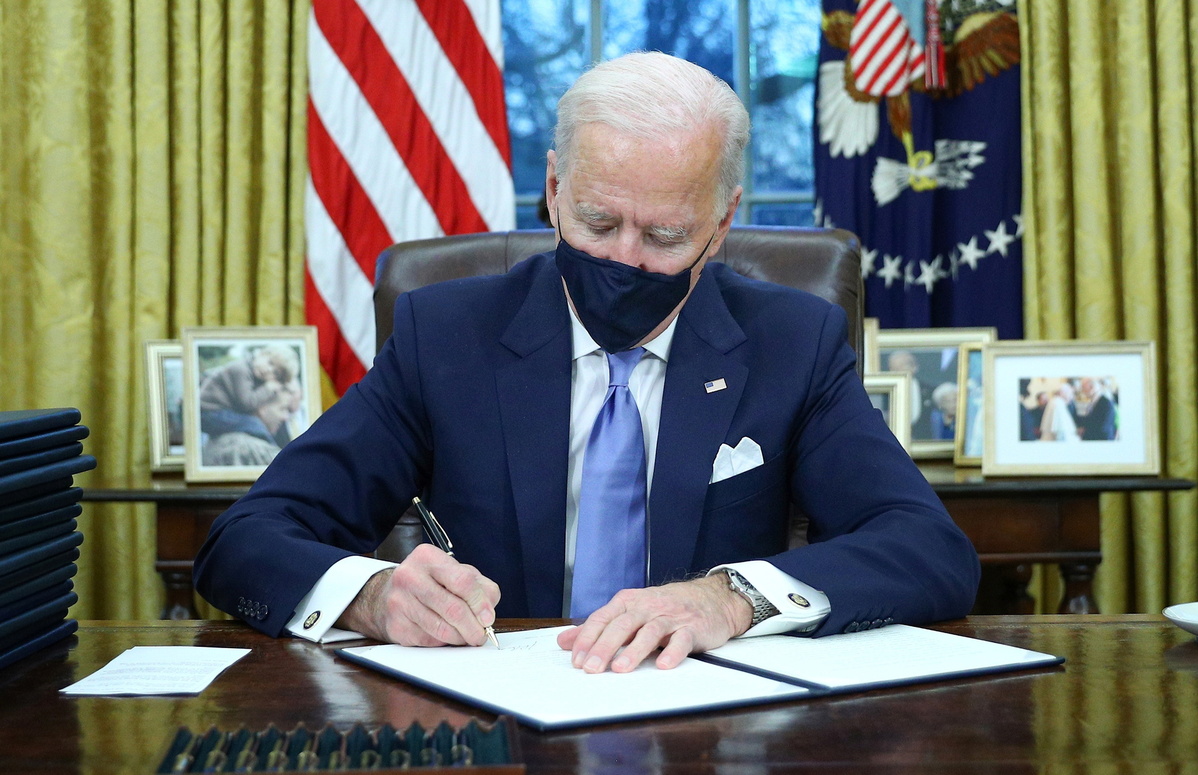
- President Biden orders US to rejoin Paris Agreement on climate change (Read more)
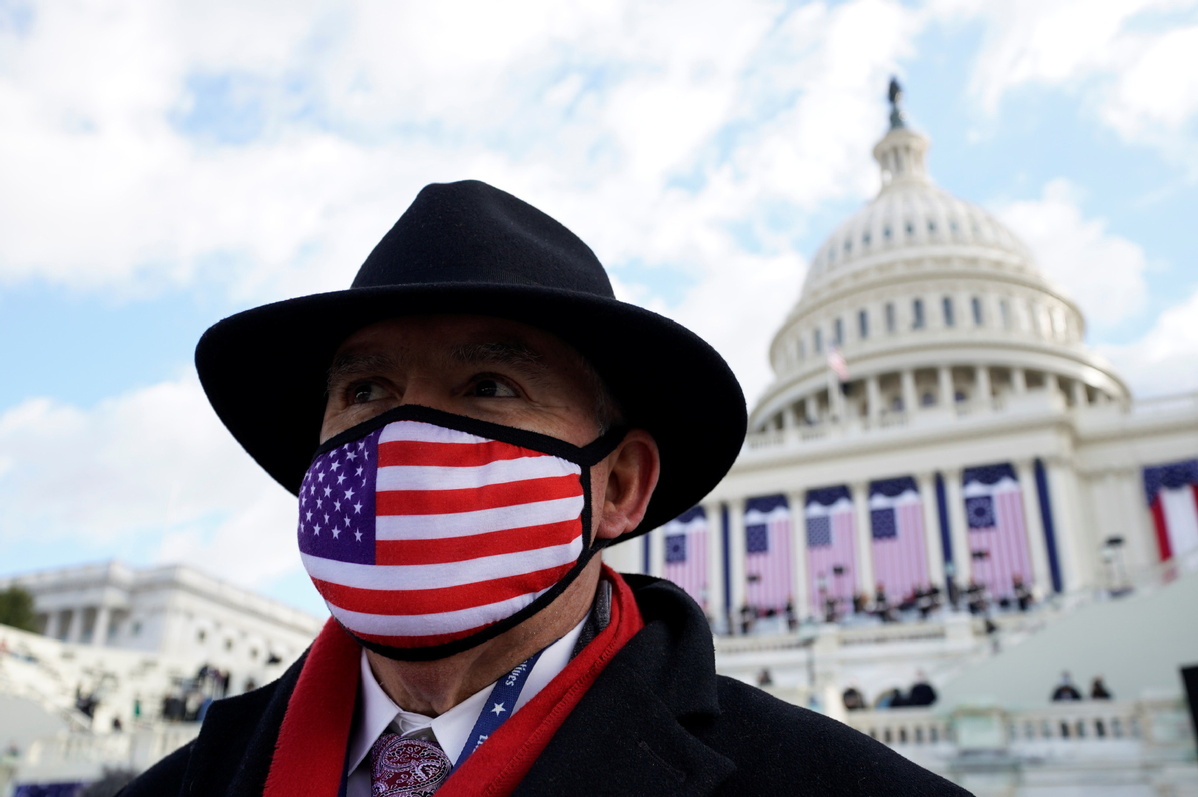
- Biden signs executive order on mask challenge amid COVID-19 (Read more)
- Biden reverses US withdrawal from WHO (Read more)
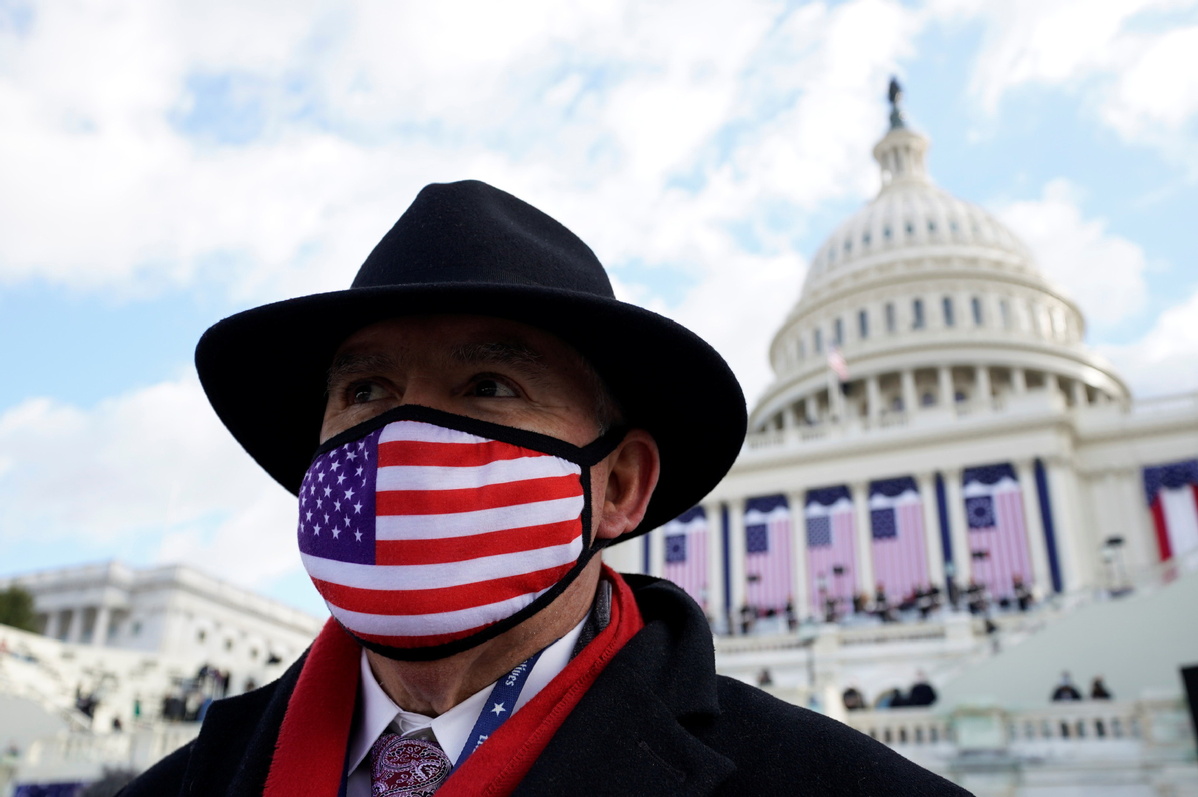
WASHINGTON - US President Joe Biden signed a series of executive orders upon his inauguration on Monday, with the first one addressing the mask challenge amid the COVID-19 pandemic.
The executive order of "100 Days Masking Challenge" requires masks and physical distancing in all federal buildings, on all federal lands and by federal employees and contractors.
As of Jan 19, a total of 37 US state governments required people to wear face coverings in public to curb the spread of COVID-19. The District of Columbia and Puerto Rico also have mask orders in place, according to the AARP, a US. nonprofit, non-partisan organization focusing on issues affecting those over the age of fifty.
Biden was sworn in as the 46th president of the United States on Wednesday. His inauguration came at a time when the country recorded over 24.38 million COVID-19 cases and over 404,000 deaths.
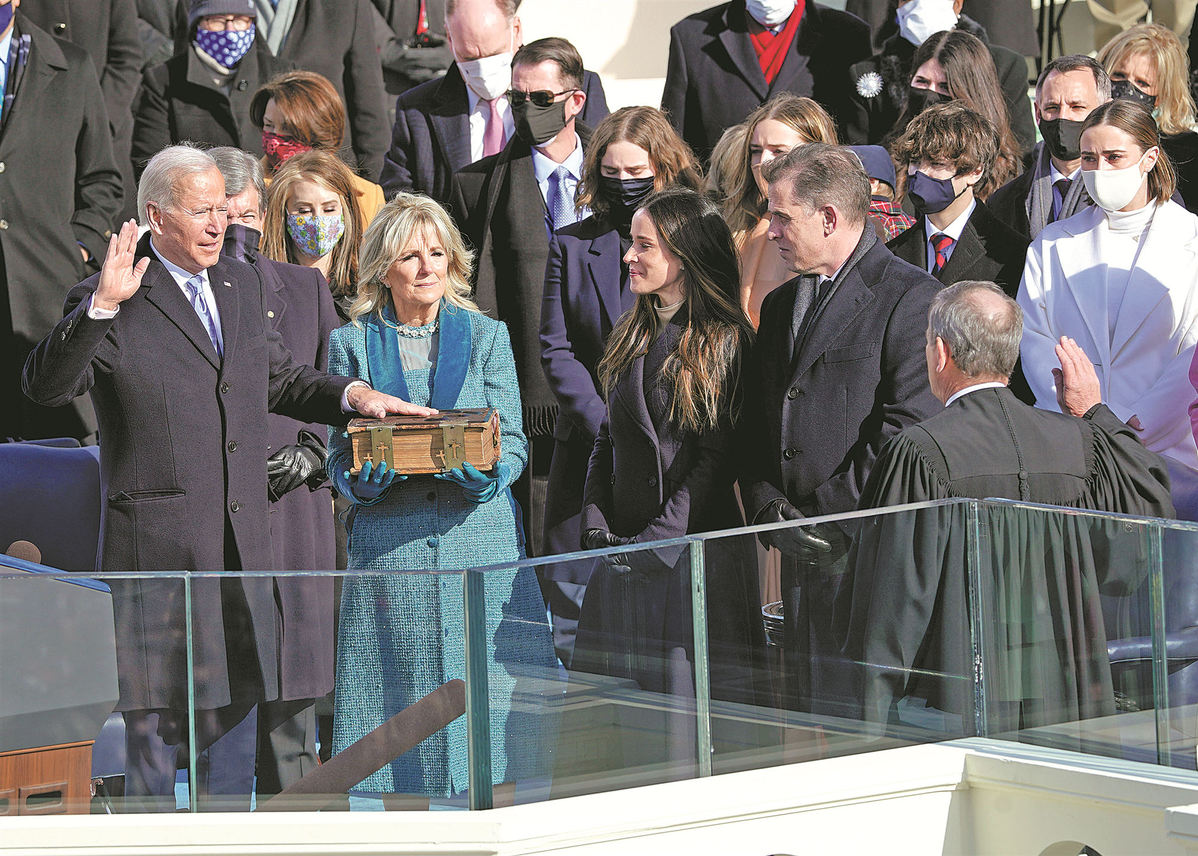
The China-US relationship is likely to start a new chapter marked by more stability and constructiveness after Joe Biden enters the White House, as the new US president seems more pragmatic and advocates cooperation, analysts said.
Biden, 78, took the oath of office on Wednesday as the 46th president of the United States, with three former US presidents — but not Biden's predecessor, Donald Trump — attending the ceremony. Trump, in a farewell speech on Wednesday, touted his legacy and wished luck to the next administration without mentioning Biden's name.
The transition of power, and signals sent out recently by Biden and his team, enable analysts to say there's reason for hope that positive changes will occur in the China-US relationship.
Xu Liping, a researcher at the National Institute of International Strategy of the Chinese Academy of Social Sciences, said that Trump has pushed the China-US relationship into a lose-lose situation. Even in the last month of his term, Trump issued radical policies targeting China that are not even in line with the overall interests of the US.
"Biden is likely to correct these policies, pushing bilateral ties in a more rational direction," he said. "While competition will continue to exist between the two countries, cooperation will also be needed in a wide range of sectors including trade and climate change."
Xu said that the Biden administration should restore communication channels with China, resume negotiations over bilateral economic and trade issues, reduce conflicts and strengthen cooperation in dealing with global issues.
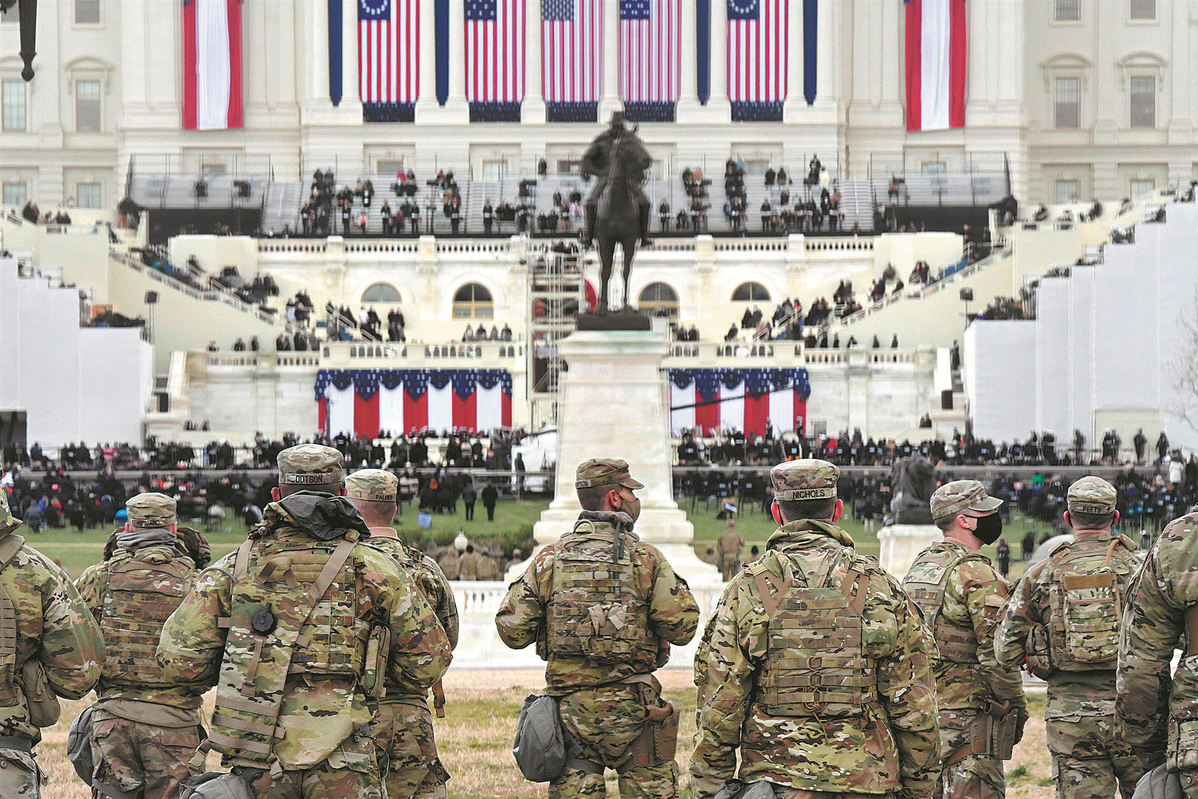
Diao Daming, an associate professor of international relations at Renmin University of China, said that as an experienced politician, Biden has witnessed the ups and downs of the China-US relationship over the past few decades.
"Biden's overall attitude toward China has been pragmatic and rational, which means cooperation in areas with mutual benefits, such as people-to-people exchanges and trade cooperation, are likely to recover."
However, Diao said, the US faces difficulties domestically that have pushed the government to readjust its views toward the outside world and its diplomatic policies, which will not be easy to change, even after the transition of power.
"There may not be substantial changes in Sino-US relations soon, but we can still expect them to be more stable, constructive and dialogue-oriented," he said.
Chinese Foreign Ministry spokeswoman Hua Chunying said in Beijing on Wednesday that China always believes that a sound China-US relationship serves the fundamental interests of the two peoples and is also the common aspiration of the international community. Despite differences, China and the US share broad common interests and room for cooperation, and they shoulder special responsibilities for world peace and development.
She said she hoped that the new US administration will work with China to step up dialogue, manage differences, expand cooperation and bring China-US relations back on the right track as soon as possible.
Domestically, Biden faces an increasingly polarized, pessimistic and pained nation, according to the latest national NBC News poll. More than 7 in 10 voters believe the country is on the wrong track, another 7 in 10 think the next four years will remain politically divided and a majority say they are mainly worried and pessimistic about the nation's future.
Biden's biggest test after he is sworn in will be "continuing to be presidential — above the partisan bickering", according to William Banks, distinguished professor emeritus at the Syracuse University College of Law in New York.
The International Monetary Fund has predicted that the US economy will contract by 4.3 percent in 2020. The number of US workers applying for unemployment claims last week posted the biggest weekly gain since the pandemic hit in March, according to US Labor Department figures.
Cal Jillson, a political scientist and historian at Southern Methodist University in Dallas, said most presidential inaugurations are national celebrations, even for many of those whose candidate didn't win the election.
"This inauguration takes place in a more divided nation. President Biden will have to lower the temperature of our national politics while slowly pulling the nation together," he told China Daily.
Biden wants Congress to act quickly on a massive stimulus package to revive the economy. He has a target of seeing 100 million shots of coronavirus vaccine injected within his first 100 days in office.
Biggest challenge
However, Jillson said Biden's biggest challenge will be addressing the polarization in the public and in Congress.
"Simple competence in distributing and administering the coronavirus vaccine would go a long way toward meeting that challenge," he said.
Stanley Renshon, a political scientist at City University of New York, said he expected Biden to emphasize overcoming divisions, bringing Americans together and taking immediate steps to put the country on the right path.
"His biggest test will be governing a deeply divided country with a veneer of moderation while attempting to cloak a very liberal Democratic policy agenda that is being pushed decisively leftward. That is not a recipe for success," Renshon said.
Biden also should signal to the world that the US will recalibrate after four years of Trump, according to Edward Frantz, a presidential historian at the University of Indianapolis.
Francis Fukuyama, a well-known political scientist, said that where the US goes after Biden's inauguration is "anyone's guess". He said the major uncertainty is what will happen within the Republican Party.
Stephen Roach shared his perspectives on the future US-China relations at a recent interview.
"There's an opportunity for a new attitude, new mechanisms, new policy frameworks that need to be seriously considered by both sides. If we can begin to rebuild some of the trust, that was so important in earlier years, I think we will have the opportunity to make greater progress."
Joe Biden, 78, is to be sworn in at noon by Supreme Court Chief Justice John Roberts at the US Capitol as the 46th president of the United States.
Kamala Harris, 56, will be the first Black woman and first woman of South Asian descent to become vice president.
Donald Trump left Washington three hours before Biden's swearing-in, the first president to skip the inauguration of his successor in more than 150 years.
Follow our livestream to watch events on the Inauguration Day.
